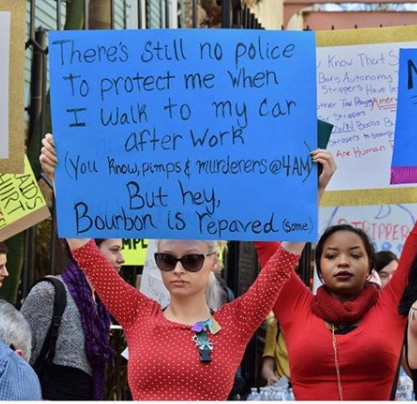Not Good For Me: An Interview with Suzy Favor Hamilton

In 2012, former Olympian middle distance runner and motivational speaker Suzy Favor Hamilton was outed as a Vegas agency escort. Recently, Favor Hamilton published her memoir, Fast Girl: A Life Spent Running From Madness, telling the story of her childhood, her athletic career, her stint escorting, her family life, and her struggle with bipolar disorder. After reviewing the book for Tits and Sass, contributor Katie de Long had a conversation with Favor Hamilton over e-mail about the New York Times bestselling autobiography. The dialogue below is a condensed version of those e-mails.
What motivated you to write your memoir?
When I was outed, I was contacted by several writers within the first couple days. I was still in a heavily narcissistic mode, which […] can be pretty common with bipolar mania, especially when untreated.
At that time, I wanted to pretty much write a sex book, detailing my adventures in Las Vegas, capitalizing on my misfortune, so to speak. No mental illness aspect at all. No running, no childhood, just Vegas. At this time, I had no idea I was bipolar…and saw nothing wrong with me.
As time went along, my motivations changed, and I grew unsure I wanted to write a book at all. My parents were making it clear they did not want me to write a book. Others were advising me against it. Things had settled down, so why bring it all out in the open again?
As I began to achieve more clarity, and what had happened to me began to make more sense after diagnosis and treatment, my motivation for writing a memoir grew again. Before the escorting, I was speaking quite a bit about my brother’s suicide and my experience with anxiety and depression, so that desire to make a difference had always been there. I saw a memoir as the most effective way of making that difference, being better understood, sharing what is admittedly a complicated story, and doing so on my terms. I thought a book could have a more lasting impact on a bigger platform.
What do you hope people will learn about bipolar disorder from your book?
I wanted to show the common elements of denial, silence and stigma and how they prevent good people from getting help, and getting well. I want people to be aware of behaviors to look for, so they can help others or perhaps motivate those not yet diagnosed to seek help for themselves.
There are many people out there who don’t buy the whole idea of mental illness and bipolar and how bizarre behavior can stem from it. The “convenient excuse” argument. I hope my story might open a few minds.
Now that you are receiving treatment and establishing a new normal for yourself, do you find yourself being treated differently? Do some people expect you to be able to return to who you were before the disorder worsened?
My parents want the old me back, but I think they are accepting that won’t happen.
There is that perception that I’m not well, mainly when I speak about sex, dress a certain way, hang with a certain person, use my voice. Or, quite frankly, if I happen to be a little manic or depressed on a certain day (especially manic). I’ve learned with certain friends and family, I…stay away from certain topics…sit on my hands and smile, otherwise…they’ll just give me that concerned look. Others, they like “this me” who’s not afraid to be myself. [They] know my moods might change from day to day, even minute to minute. Those are the people I tend to gravitate to these days.
Those who don’t get mental illness think you have to be a non-functioning zombie when you’re manic…In many ways, you can be more productive, more creative, and go, go, go, etc. I believe my mania was a big reason I was a desired escort…My clients loved my mania. Disney, who hired me for their racing series, also loved my mania when I think about it. Zero inhibitions. Bubbly, sparkly. Life of the party. I had no off switch, no ceiling.
I am that imperfect girl, and I want to be that imperfect girl. What’s the bipolar? What’s the real me? I just know I want independence, [to] do what makes me content. I still want to live life to the fullest, live it with a little edge. Don’t want to live by others expectations. Be myself. But admittedly, I’m pulled into old habits often where I do what others expect of me. People are so accustomed to the old me that they think I’m not well when they see someone else.
Let’s say I were to want to go to Burning Man, go hiking with a couple of escort friends, post a beautiful nude portrait of myself that was done for me…many around me would raise red flags. I’m having to be something to please others and doing what drove me to craziness in the first place. So am I going to get criticized on occasion or told I’m not well? I suppose. Dr. Phil said as much when I was on his damn show.



